@tccthecollegian • collegian.tccd.edu
Trump president for another term Voters talk presidential outcome
Republicans take Senate control back
FOUSIA ABDULLAHI
editor-in-chief
collegian.editor@tccd.edu
President-elect Donald J. Trump won 312 electoral college votes beating Vice President Kamala Harris who won 226. The Republicans will control the Senate with 52 seats. Ballots are still being counted in House races.
Trump won all seven key states Arizona, Georgia, Michigan, Nevada, North Carolina, Pennsylvania and Wisconsin. Many are looking to the House seats to see if the Democrats can shore up votes to counter the Senate.
President-elect Donald Trump’s campaign platform, Agenda 47 was almost identical to his in 2016 with a focus on the economy, the border and deregulation.
“He’s pro-life, or at least trying to protect a lot of the innocent children’s lives that are being born,” former TCC student Jeffrey Thomas said. “And closed, yeah, closed border, just immigrants can come in, properly with the right documents, and that they’re not coming in illegally.”
Trump ran for president for
The Collegian wins student journalism’s ‘Pulitzer Prize’
HUDA QURESHI
managing editor huda.qureshi@my.tccd.edu
The Collegian won 24 national awards at the CMA/ACP National College Media Convention in New Orleans this year, including the Pacemaker, often referred to as “The Pulitzer Prize of college journalism.”
Current editor-in-chief, Fousia Abdullahi, said she is honored The Collegian received these awards. She said it’s not an easy award to win and requires a lot of hard work.
“I really have to give it up for the whole Collegian staff th is semester and previous semesters, the designers, reporters and photographers all work together to bring news to the district weekly in print and online,” she said. As one of the student advisers of The Collegian, Chris Whitley emphasized the work students put in to receive an award of this caliber.
“They spend late nights,” he said. “They work incredibly long hours. They have exacting standards. Good enough is never good enough for most of them, for all of them, really.”
Among all the wins, Hope Smith, former editor-in-chief of The Collegian, was awarded the individual award of two-year reporter of the year. She made it as a finalist and said she was relieved and excited when she found out she won.
“It was a privilege for me to get it and I had so much support and guidance from The Collegian to bring me there,” she said.
Smith started out as a nuclear physics major and said she found her passion for journalism after taking Whitley’s class, as a sort of accident when The Collegian was looking for writers and she took up the opportunity. She said she is drawn to journalism because of how it involves public service.
“I really like the fact that I get See Awards, Page 4

Supporters watch returns at election watch party for President-elect Donald Trump at the Palm Beach Convention Center, Wednesday, Nov. 6, 2024, in West Palm Beach, Fla.
the third time and is the only president who is a convicted felon. Vice president-elect JD Vance who early on was not expected to be Trumps vice president pick is known for being the author of Hillbilly Elegy with controversial quotes.
“Under President Trumps leadership, we’re never going to stop fighting for you, for your dreams, for the future of your children,” Vance said. “And after the greatest political comeback in American history, we’re going to lead the greatest economic comeback in American history under Donald Trump’s leadership.” Democrat and Independent voters are concerned about the first 100 days of a Trump presidency especially about a woman’s right to choose, LGBTQIA+ issues, immigration, the economy and the environment.
People are contemplating what the next four years means for all Americans and what part they can play. NE student Ash Martinez said prior to the election she was busy with school, so she didn’t do a lot of research because she knew how she was voting but decided to go back after the results and look at some of the issues more closely.
“It’s unfortunate to see that See Recap, Page 4
FRED NGUYEN
campus editor collegion.editor@tccd.edu
After an emotional election year, some students are struggling to process the results.
TCC counselor James Varnado said students are feeling the effects of this election and, depending on how they lean politically, their mental health may be impacted in different ways.
“Some feel that the world is coming to an end, and others feel that [it’s the] best thing since sliced bread,” he said.
Women, immigrants, LGBTQ+ Americans and other minority groups have expressed concerns about Trump’s views and potential policies on key issues.
NW student Isabella Ortiz said even though she was not surprised, she was still troubled to see Trump win and afraid of what might come next.
“It's just kind of scary,” she said. “I'm fully Mexican, and so he definitely goes against Hispanics, and that's scary to think about [it] affecting my community. And I'm also a woman ... and that's also the scariest part.”
Trump has promised during his
See Mental Health, Page 5
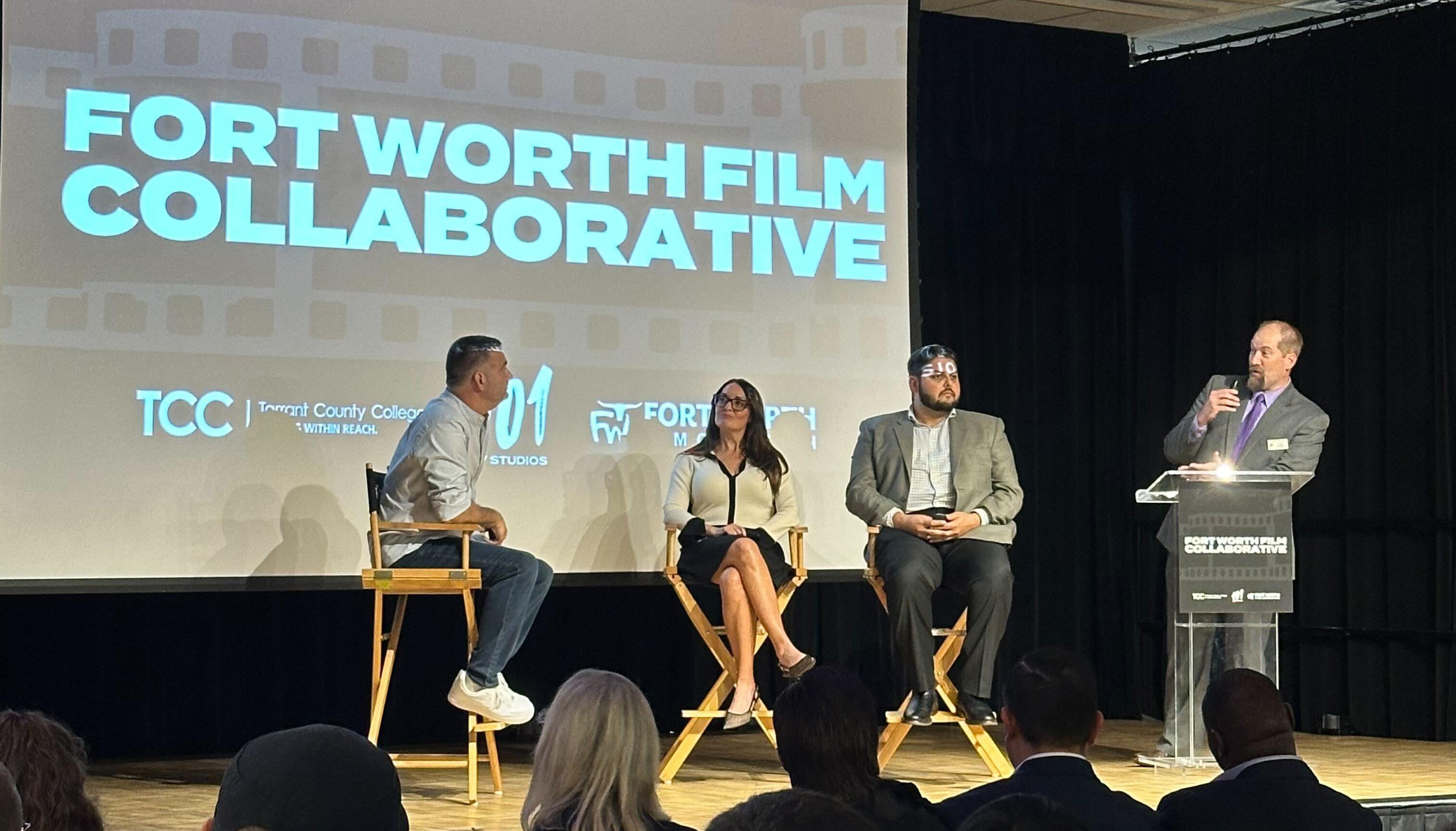
opportunities
Certificate program creates local jobs
FOUSIA ABDULLAHI
editor-in-chief collegian.editor@tccd.edu
The Fort Worth Film Collaborative hosted a premiere screening of the Paramount show "Landman." The event gave students and the community the opportunity to learn more about the Fort Worth Film Collaborative Certificate Program. The event started with a red carpet that brought the feel of Hollywood to the campus. After watching the first episode of "Landman," there was a Q&A, panel discussion with students from the program, and 101 Studios Production executive John Hermansen. It was led by Instructor Sean Fousheé, who is the coordinator of the program. "We're involved,” Hermansen said. “We started the program here. We want Texans to become our filmmakers. "Our intention isn't to make this Hollywood south. Our intention is to enjoy all the beautiful fruits of Texas and make it a
filming community."
NE interim President Jan Clayton highlighted that the state allocated 200 million dollars to attract more shows and films to bring their production to Fort Worth. The collaboration expressed the need for more students to become certified in critical areas in the film industry.
"Those programs included print and electrical hair and makeup and light commercial construction," Clayton said. “We are proud to have a 100% job placement rate with a continued demand for more of our graduates."
New Fort Worth Film Commissioner Taylor Hardy said the demand for more people to work in the industry is growing and its partnership and legislative funding are essential.
"Education helps to create jobs and opportunities for locals, and we have such a demand right now for that trained local crew," Hardy said. "So, I'm excited to watch as the program has grown and continue to provide opportuni-
ties for students." Clayton said they are adding more certificates in camera, sound, art, and costume. Future certificates are being planned for hospitality, logistics locations, and podcasting to meet the growing needs of the industry.
We started the program here. We want Texans to become our filmmakers.
John Hermanson Production Studio Exectutive
Students Beth Hudson and Daniel Vazquez, who graduated from the program, spoke about the impact of the certifications and connections they've made in the program.
"The pipeline that TCC has created is really like a shortcut to these job opportunities that are out there in Fort Worth right now," Vazquez said. "I couldn't have asked for anything better than to really get my resume and get my experience out to people that are hiring."
Hudson, who always saw herself working on sets, got a job working in the art department of Nickelodeon, building SpongeBob and Ninja Turtles sets for the Kids Choice Awards.
"It's accessible,” she said. “Not everybody can go to [a 4-year university]. Here you can get the whole certificate for under $1,000, so the fact that it's so accessible is just really important."
When it comes to bringing Hollywood to Texas, legislatures are concerned about the cultural influence and there is a stipulation that at least 50% of the members working on productions must be Texan.
The Film Collaborative See Film, Page 4
Philosophy professor shares life outlook
Mark Anderson has been a philosophy professor at TR for 15 years and has published several papers for philosophy journals.
in Thought
is also the sponsor of the
a philosophy
on academia and teaching during a recent interview with The Collegian.
What do you do outside of philosophy and teaching?
I have a great deal of interest in literature. A lot of what I’m doing outside of the fold might still be related to my vocation. Yesterday, I started a book on Buddhist thought, for instance. Now this is not a vocational requirement, but it’s something I do because I’m now teaching the world religions class, and I kind of need to make sure I’m current. I confess that I do game.
I’ve noticed you have this very strong presence when you’re standing in front of the class. Have you ever considered doing radio?
I could imagine being on a radio show, and my poor listeners will be tearing their hair out in frustration waiting for me to get to the point as I’m trying to discover how I really want to whatever carve this thing where the joints are, how to exactly identify the pressure points of an issue. Talk radio people are much more verbose, loquacious and quick in trying to get their zingers in, and that’s not for me. It takes me a while to get to the point if I’m doing it on the fly. So, I think that if I were in radio, I would torture the listeners rather than entertain them.
If you weren’t a philosophy professor, what would you have been?
I went into teaching because it was the natural domain of somebody who was interested in these issues. What do you do if you’re interested in these issues? You talk about it. Now, if I’m not talking about it in in front of a classroom, what am I doing? I’m probably under a bridge somewhere, panhandling.
You insert a lot of your own personal experiences and anecdotes in class. Do you find it’s easier to teach when you have a story to tell?
Because you’re dealing with very abstract ideas, you have to make them concrete. I’ve had a concrete history for 40-someodd years, and so I can draw from those stories. Sometimes you can draw from other stories too, but you have to do something to make it relatable. So yes, personal anecdotes are pretty handy, and there can be other stories as well that you pull from.
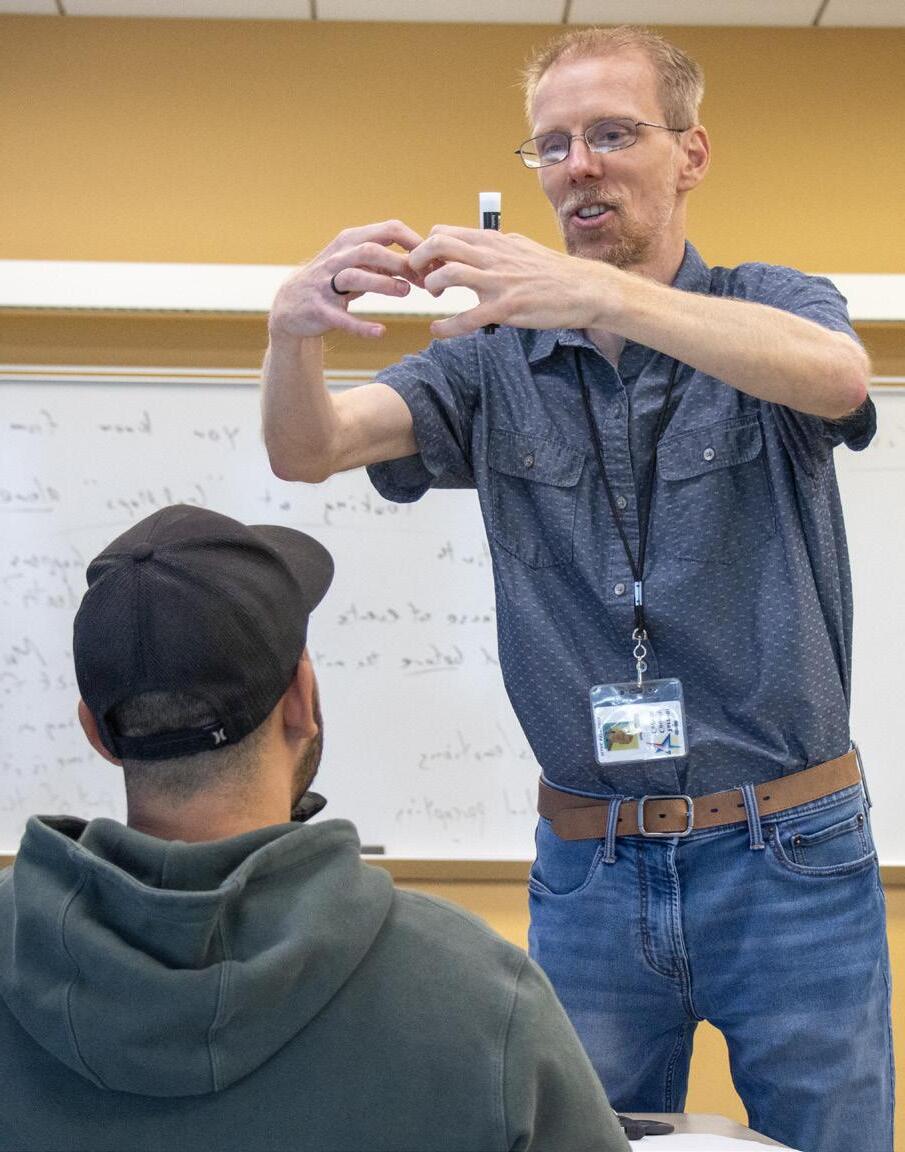
What did you do before you came to TCC? You’ve said you were a vacuum salesman?
I was a Kirby salesman for two weeks. I was in grad school. And in the summertime when you’re in grad school, you’re basically living in poverty. So you’re doing what you need to do to make ends meet.
Do you have anything else to say to TCC students?
Stay in the game. Learn a lot. There’s a world of opportunity out there, and the goal of education is to connect you to that opportunity. So, take advantage of this. This institution is performing a vital function for the community. Employers in the county are counting on us.
What made you want to go in philosophy?
I guess I've always had interest in ultimate issues. Philosophy was not my major as an undergraduate. I was a literature major and a philosophy minor. But usually I find literature, the best works of literature, to be interesting because they tap into ultimate issues using the medium of real life rather than mere abstraction, and that was kind of what brought me into thinking about philosophical issues.
What would you say you’re most proud of in your work?
I’m the sponsor of a club here at Trinity River. One of the very first presidents of that club, just a few weeks ago, he got back in touch with me, and he came back and he attended a meeting with the club. And you can see that the club made it made a difference. Now the club is just one thing, but when you’re kind of realized that people who haven’t been around for a decade and a half or whatever, still remember the class, and they still remember the discussions. Okay, that’s kind of what matters more...I think I’m more proud of that than any silly academic projects I might have on the side.


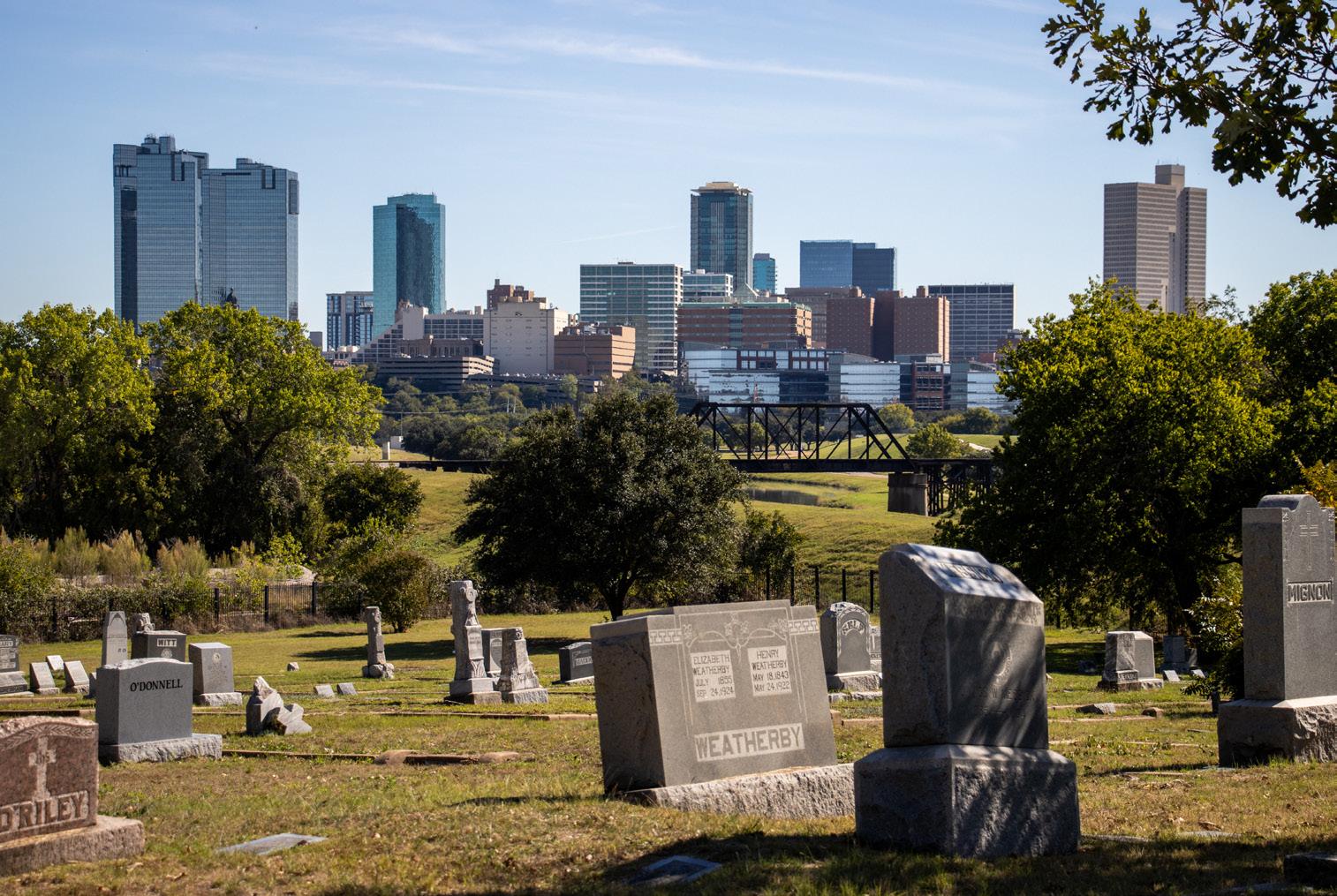
Cemeteries preserve Fort Worth’s diversity
ROSSY FERMIN staff reporter collegian.editor@tccd.edu
FORT WORTH, TX – In the heart of Fort Worth, beneath the quiet earth of its historic cemeteries, lie the stories of the city’s past that reflect its growth, transformation, and diversity over the years.
Local cemeteries like Oakwood, Trinity, and others, serve not just as final resting places but as markers of Fort Worth’s cultural and racial history. These sacred spaces hold more than the remains of the deceased, they bear witness to the lives and legacies of the people who helped shape this Texas city.
During a recent event on the significance of Fort Worth’s cemeteries, Gaby Kienitz, a librarian, and archivist with the Fort Worth Library, emphasized the role these sites play in understanding the broader scope of the city’s history.
“History doesn’t need Hollywood, it’s dramatic enough,” Kienitz said.
She highlighted how the rich and varied history of Fort Worth can be found in the lives of those laid to rest in its cemeteries,
without needing embellishment or romanticization.
Kienitz, who served as the speaker at the event, explained that the cemeteries reflect the many layers of Fort Worth’s historical development, highlighting how different communities have been treated over time.
“So, they can get an appreciation of local history and to understand that local lore is not true history,” Kienitz said.
She noted that what might be passed down as local myth often overlooks deeper, more complex truths. These cemeteries hold the history of the city in a more authentic, accessible way.
One of the most important aspects of these cemeteries is how they chronicle Fort Worth’s cultural and racial diversity. The segregation of burial sites in earlier periods, though painful, is a key part of understanding the city’s social structure and how race, class, and ethnicity shaped Fort Worth’s development. Oakwood Cemetery, for instance, is made up of several sections, each with its own history and, at one time, separate racial boundaries. “Oakwood is actually composed of See Cemetery, Page 4

Campus celebrates fall with dance, crafts
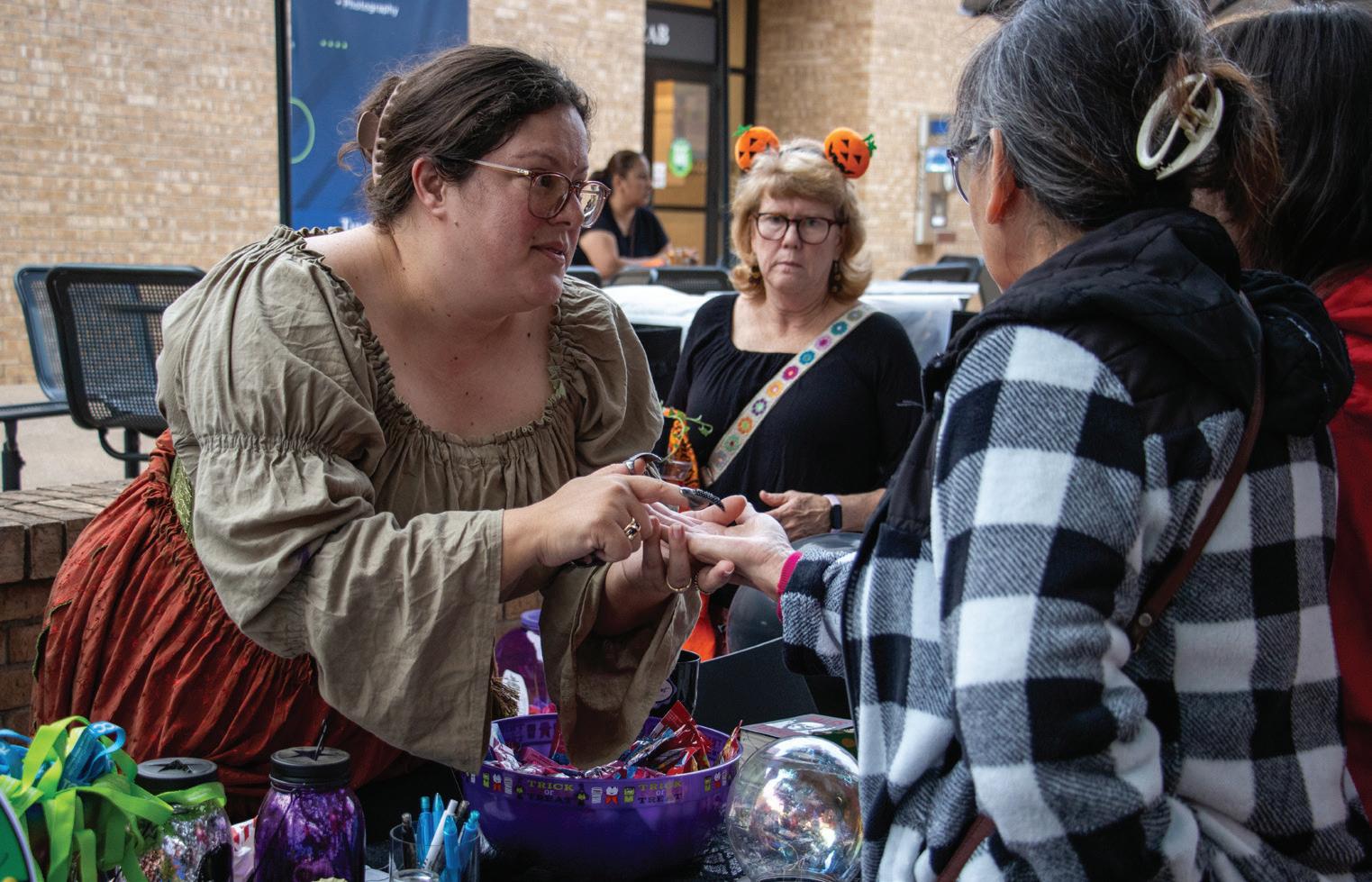
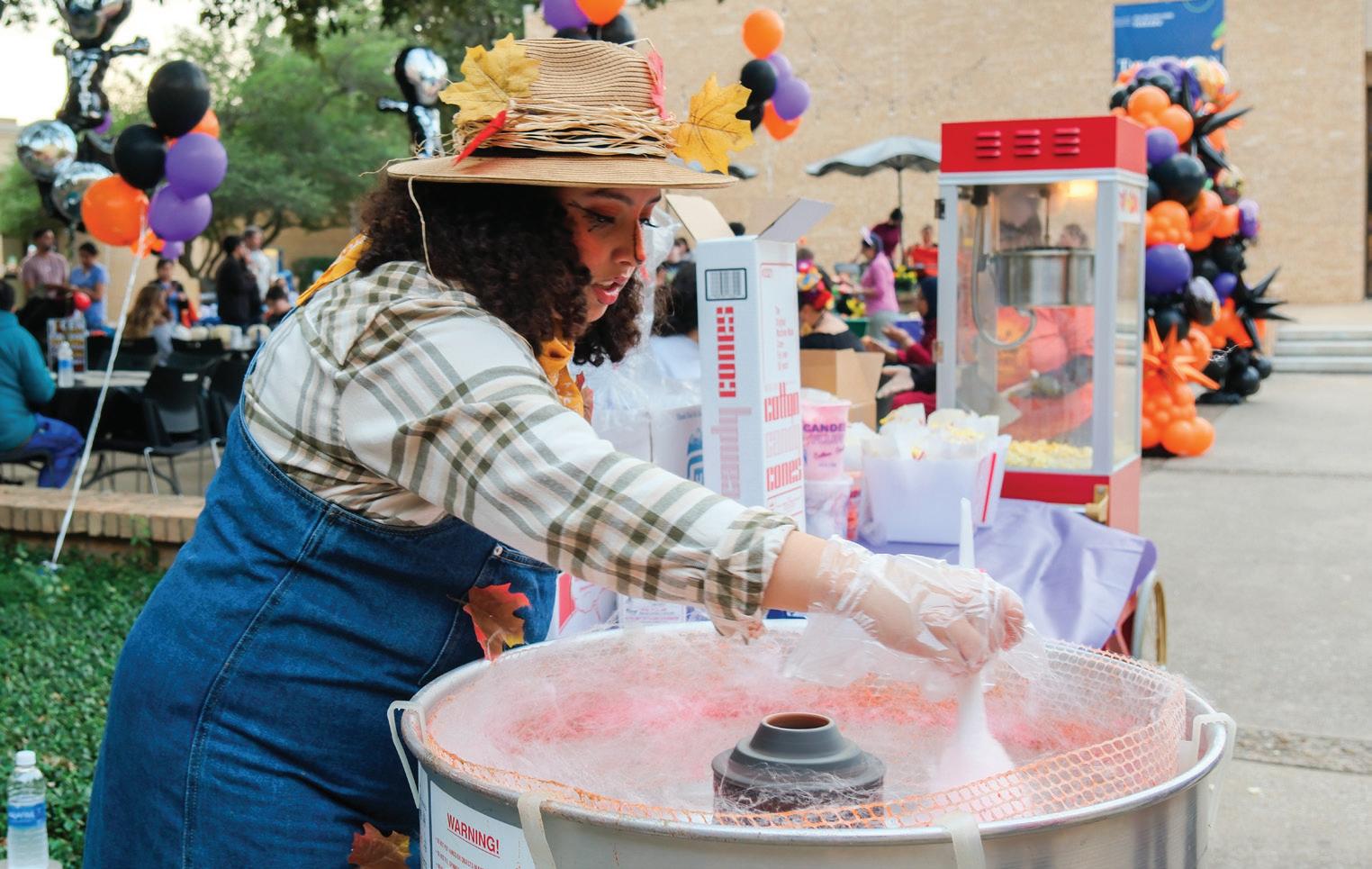

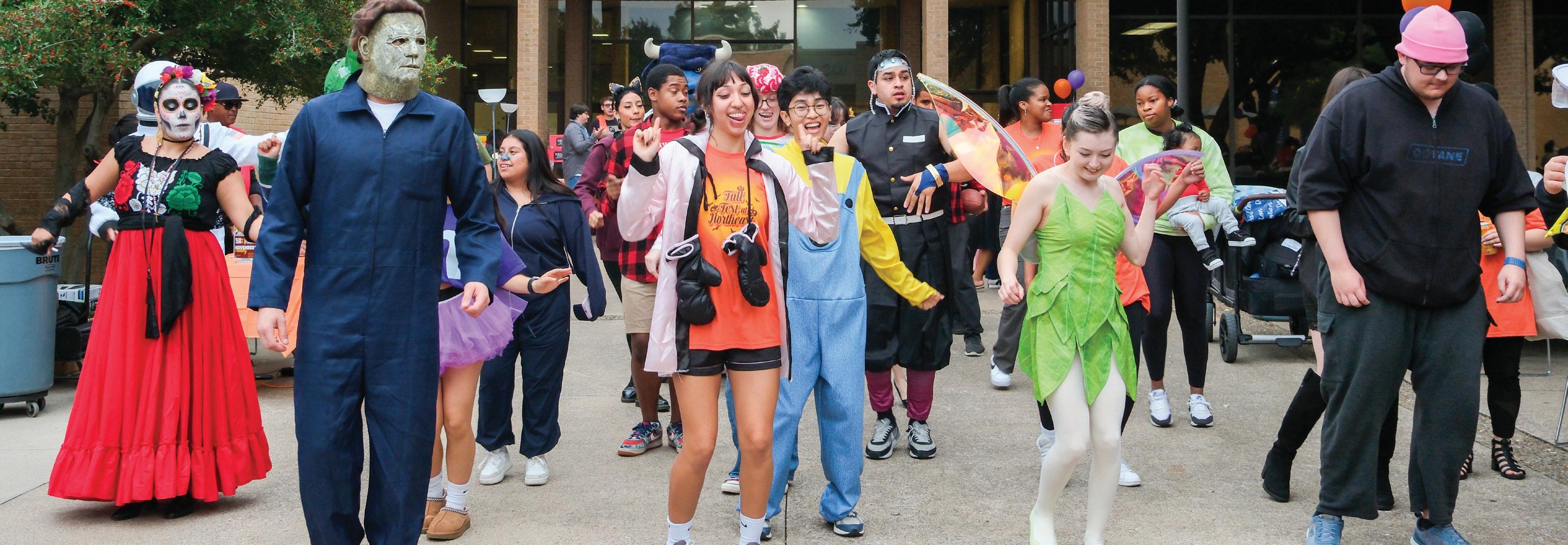
SE students gather to watch this year’s election
FRED NGUYEN campus editor collegian.editor@tccd.edu
The election watch party at SE Campus brought TCC students together to engage with politics, regardless of differing personal beliefs.
Incoming SE student Tatiana Humphries sat at a table of people with different views from her and had a discussion to challenge each other’s beliefs.
“When you have people sitting together that have different political views and you can actually have a conversation with [them], it can change your perspective,” Humphries said.
The watch party was a collaboration between the SE Phi Theta Kappa chapter and the SE Civic Engagement group to encourage civic involvement among TCC students. The event featured food, board games and prizes to occupy attendees watching news coverage of the election in the SE01 Ballroom.
President of the SE Campus PTK chapter Marissa Sanchez said the watch party helped create camaraderie among the community, especially in a divisive political climate.
“We’re trying to make this very fun event ... just to bring together people who may try to separate themselves, especially during these hectic times,” she said. “[We want to] remind them that we are one country. We are collectively American.”
Jarrait Humphries, vice president of service and fellowship of SE’s PTK chapter, said the event was a way for people to start conversations and inform themselves.
“It opens the door to actually be able to talk about politics,” he said. “A lot of people feel closed off ... and I think this provides a good outlet where people feel like they can ask questions and try to figure out what’s going on.”
On the walls of the room were papers where students can write their thoughts on questions like “Voting is important because
Awards
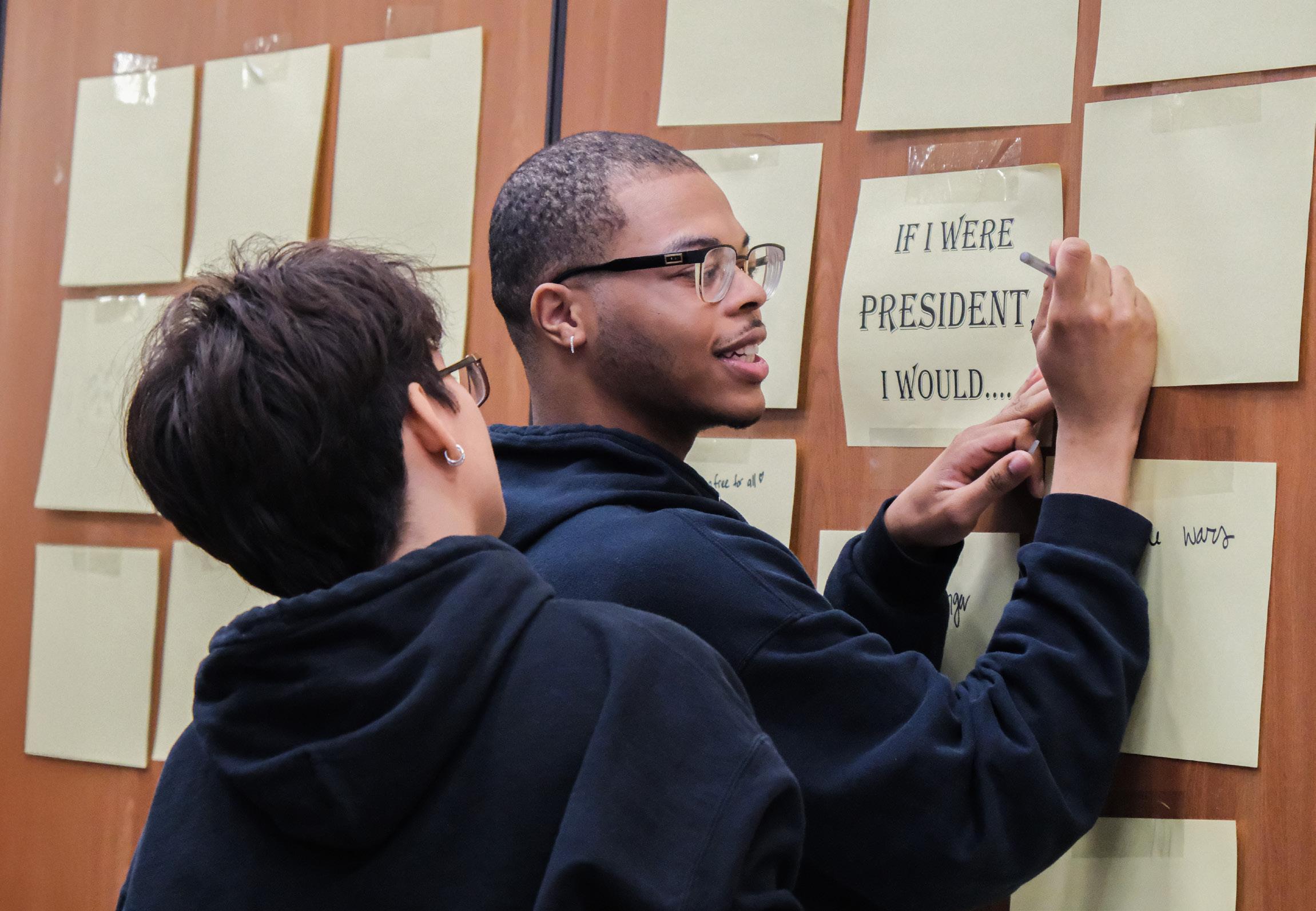
Some answers written were “it allows for my voice to be heard,” “to keep politicians in check” and “it is in the Constitution and allows the United States to unite as one.”
TCC graduate Tam Ho now goes to University of Texas at Arlington but came back to her home campus to support PTK. Ho,
(continued from page 1)
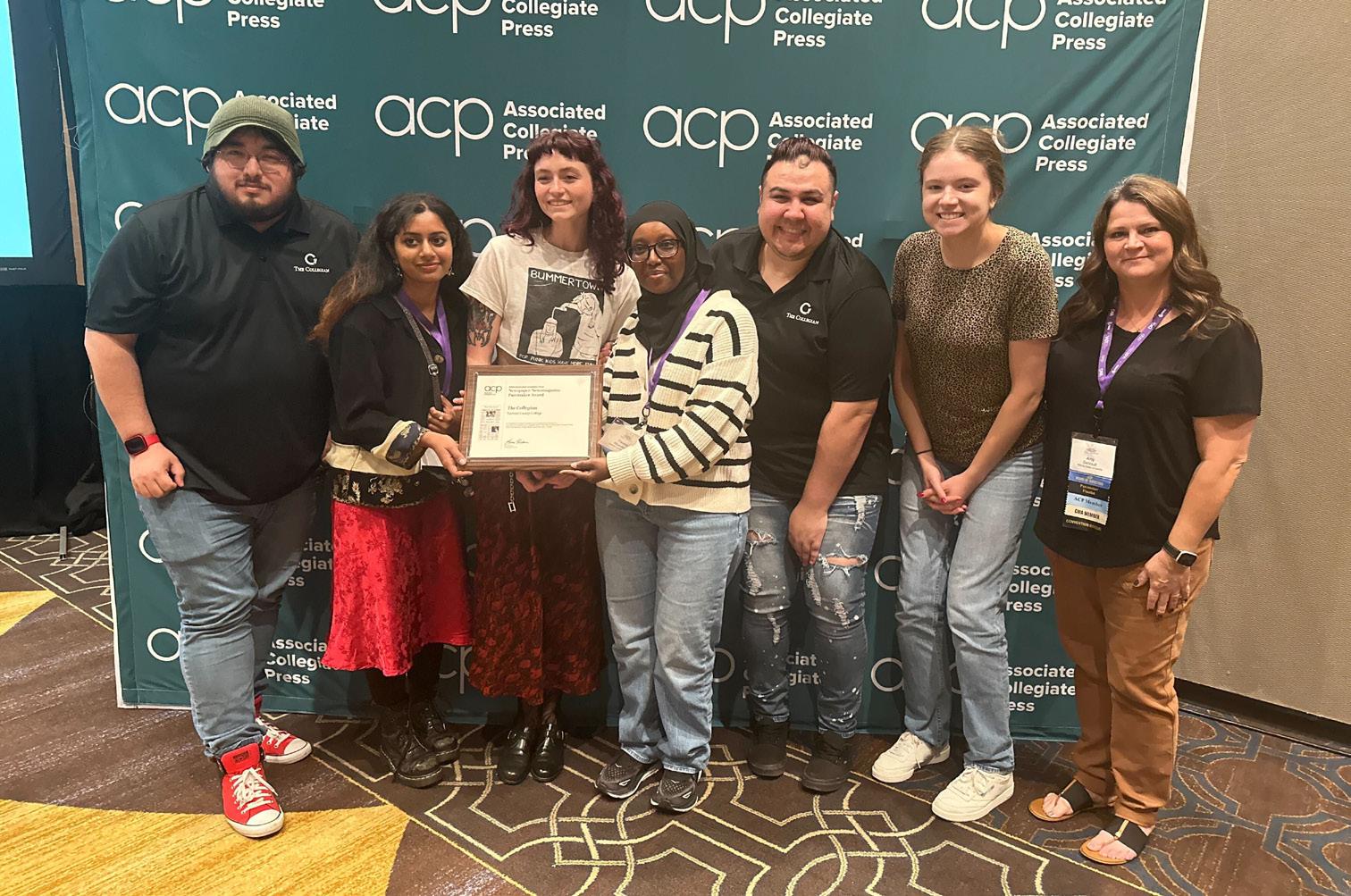
HUDA QURESHI managing editor huda.qureshi@my.tccd.edu
to gather as much information as I want,” she said. “I get to put it together in a way that’s digestible, that’s accurate, and is able to inform people … I think it goes back to that knowledge is power thing, contributing to that means a lot to me.”
Alongside Whitley, Lori Dann and Stacey Luecker are also advisers for students of The Collegian. Abdullahi said they contribute to the success of the students.
“Everyone really works hard to make
Film (continued from page 1)
brought Sara Joyner, executive producer for Trilogy Studios, to speak about the program’s importance to the community.
“I know TCC has a really good reputation in DFW as being forward thinking, so that’s why we focused on coming here and being involved with TCC,” Joyner said. “We know this is the future. This is where business is going to grow. And selfishly, we want to bring students from the local area and keep them local, keep them in Texas to grow the Texas film industry. We really just want Texas film to stay in Texas.”
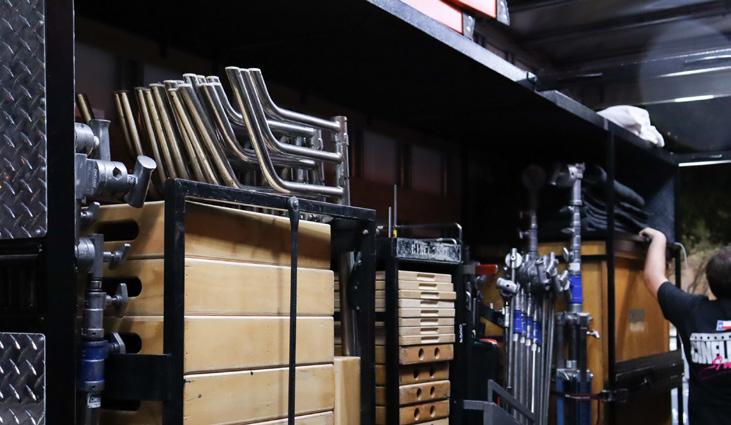
these things happen and a lot goes into it, other than just getting a story,” she said.
“With their direction and with their help, it’s been a really great place to learn for student journalists. It’s not just one person, it’s everyone working together.”
Abdullahi wants The Collegian to impact the college environment by practicing comprehensive reporting.
“Our job is to tell these stories that are important and make sure that people whose voices are not necessarily heard across the district are heard,” she said. “And telling really important stories that matter to people’s education, to people’s careers and the overall atmosphere around campuses.”
a former PTK member, could not vote this year because although she had passed the citizenship exam, she had not taken the oath ceremony yet.
Ho said voting could affect politics at a local and national level.
“I used to think that one vote didn’t matter, but my professors and everybody said that [was] actually not true,” she said.
SE student Adekunle Adio said this election will be a crossroads for the nation, which seems to be split in two.
“We really need to ... go back to one nation united together,” he said. “I think this election will show the division. And afterwards, it brings healing, which might bring unity.”
Cemetery (continued from page 2)
Several cemeteries, which were segregated in the past,” Kienitz explained.
These historical divisions, she pointed out, reflect not just the division of physical space but also the societal divisions that governed people’s lives and deaths.
“Cemeteries are really representative of how the living are making their way and how they are treating the dead based on the laws and goals and feelings that the people had in those times,” Kienitz said. As Fort Worth grew, so did the way people thought about death and remembrance. The shifts in how the city’s cemeteries were organized over time mirror the broader cultural and political changes the city has undergone.
The preservation and care of these cemeteries has become an important task for the community. Fort Worth’s Cemetery Association plays a critical role in maintaining these spaces. The association works to clean, restore, and preserve cemeteries that are no longer accepting new burials, ensuring that they remain well-kept and accessible for future generations.
“Everyone who came and lived their lives here, they are representatives of the people,” Kienitz said. He emphasized the importance of remembering and honoring those who paved the way for Fort Worth’s modern community.
Many of the city’s older cemeteries face challenges related to aging infrastructure, neglected tombstones and the loss of original burial records. Community efforts to support the maintenance of these sacred spaces help ensure that the histories they contain are not forgotten.
(continued from page 1)
we have a felon and just a bad person for our country, and what’s going to happen with women’s rights and LGBTQ rights and the dangers that we’ve been put into,” she said.
Tarrant County continued to stay red for the presidential vote but turned blue for the senatorial race. Colin Allred won Tarrant with 48.87% to Ted Cruz’s 48.72%.
Tarrant County Commissioner Tim
O’Hare said on election day that early voting and election day voting turnout use to be more predictable.
“There was a time, not all that long ago, where Election Day outnumbered early voting by a pretty significant margin.”
O’Hare said. “It just doesn’t anymore.”
According to the Tarrant County Election Administration of the almost 1.3 million registered voters, 826,039 of them voted. That’s only 63.59% of eligible voters.
Tarrant County’s race for Sheriff was one that many kept an eye on because of the controversy that’s surrounding the deaths in Sheriff Bill Waybourn’s jail.
On election night Jake Davis, fundraising chair for the Democratic Party, spoke about the importance of local races.
“The biggest thing are the jail deaths,” Davis said. “Nobody should die on the state’s watch, and we in America have a right to a speedy and expeditious trial, and unfortunately, under the GOP watch, that hasn’t been happening.”
Davis emphasized the importance of young people becoming more involved in politics regardless of which party they vote for.
“You’ve got to work hard to find people to elect and to unseat those people that you don’t agree,” Davis said. “And everybody, Democrat, Republican, Independent, needs to be held accountable.”
Davis, a member of the LGBTQIA+ community said that while he voted for Colin Allred that he disagreed with his anti-trans rhetoric.
“I do understand there are some centrist Democrats and centrist Republicans who are tired of Trumpism, who are tired of “MAGA”-ism, who are tired of Ted Cruz,” Davis said. “And so, he is maybe appealing to those folks to kind of get them to swing to his side.”
“Cemeteries are the cities of the dead,” Kienitz stated. “It’s a city of the historical past.”
According to Kienitz, the cemeteries themselves are just as important as the buildings and monuments that make up the city’s skyline.
As Fort Worth continues to grow and evolve, its cemeteries remain vital to understanding the forces that shaped the city. They are more than just burial sites.They are repositories of local history and reflect on the values, social structures and changes that have occurred over time.
It is through efforts like those of the Cemetery Association, along with community involvement, that Fort Worth’s cemeteries can continue to tell the true stories of its diverse and complex past.
Through preservation, education, and respect for these historical spaces, Fort Worth residents can ensure that future generations will be able to appreciate the full scope of their city’s history and not just the polished narratives but the real, human stories that lie beneath the surface.
“Cemeteries really represent different time periods,” Kienitz said. “And through their preservation, they will continue to serve as a living testament to the city’s rich and diverse history.”
For those interested in helping with cemetery preservation or learning more about Fort Worth’s historic burial sites, the Fort Worth Cemetery Association welcomes volunteers and donations.

With many concerned about election security and fraud and potential Jan. 6th events, Allred reminded Texans about true patriotism.
“It shouldn’t be remarkable to have to admit defeat,” he said. “You can’t just be a patriot when your side wins. Tonight, we didn’t win, but we will continue to be patriots.” Alex Hoben, Ash Petrie, Cheyenne Shawn, and Lauren Harper Contributed to this story.
Mental health
(continued from page 1)
campaign to carry out mass deportations and work toward closing the US-Mexico border in his campaign. Trump has also taken credit for the overturning of Roe v. Wade. While some students felt negatively about the results, others say that they were hopeful.
NW student Jade Almeida said she was not surprised to see Trump win.
“[We] should give him another chance,” she said. “Hopefully, it goes good. Hopefully better pay with jobs and better opportunity with working, being able to separate from the border and all that.”
NW student Patrick Markovich said the results did not affect his mental health overall.
“I’m focused on other things because I see where this is going,” he said. “It’s going to be like every other election. People are going to get heated over one side and another. ... I just saw this coming. I know how people are going to react.”
Some Americans, including Ortiz’s family, have expressed that they have considered leaving the country in the wake of the election results.
“I actually have dual citizenship,” Ortiz said. “And my family has definitely spoken about if anything crazy did happen, we do have that choice.”
Markovich said leaving the country because of the election results would be a drastic reaction because Trump won’t be president forever.
“We only have to get with it for four years,” he said. “So, stick it out. And if you feel like you want things to change and you want things to get better, sometimes you do have to stick around so it can get fixed.”
Varnado said there are other ways for people who are upset with the results to live through the next four years and compromise.
“I say this: Express your opinions and do not get all bent out of shape,” Varnado said. “But express your opinion with commitment. Don’t try to persuade a person ...but try to examine the facts.”
For some, however, this did not seem viable.
Ortiz said she does not believe the two parties can work together.
“I think that right now, the Republican Party is very radical, and I don’t know if compromise is something that they’d be willing to do,” she said.
CAMPUS VOICES
“How will the next four years of Trump presidency affect your life?”
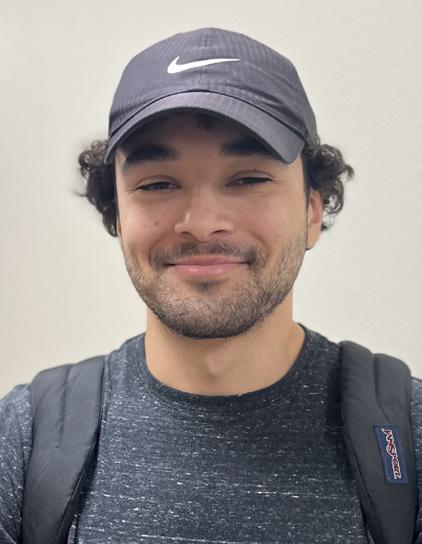
Christian Joyner NE Campus
“As a black man, I think it’s going to be interesting seeing police officers have immunity. Not looking forward to the potential of losing people in my community to that. As someone who uses FAFSA ... if I ever wanted to go back to school and couldn’t front that money or go on a payment plan, I’m kind of out of options.”
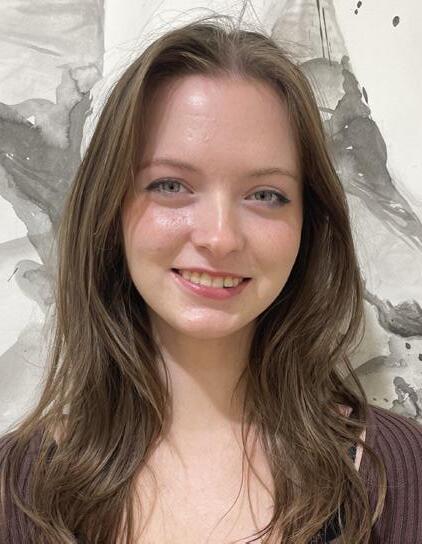
Isabella Rittenhouse SE Campus
“My mom had me and my sister through IVF and I know a lot of republican lawmakers are passing stuff that makes it more difficult. I think it’s really important that anyone has access to that. I don’t think religious views have any place when it comes to health care.”
CAMPUS EVENTS
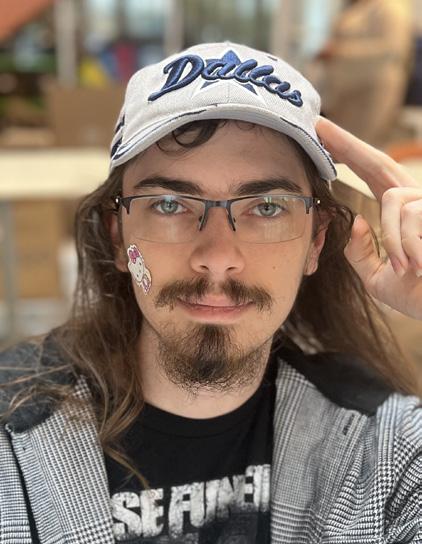
Patrick Markovich NW Campus
“For me personally, I couldn’t really say. I could see [Trump] is going to focus on providing — at least that’s what they say — providing jobs for the American working on some of the industries. And I guess, taking a different direction, as opposed to [Democrats] when it comes to the inflation issue.”

“I’m kind of anti-government already. I don’t really believe that the decision impacts negatively or positively. It never makes that big of a difference, whoever gets voted [in]. It will be interesting to see policywise, especially healthcarewise for everyone. It’s sad how polarized everyone is.”

Isabella Ortiz NW Campus
“I’m not sure. I’ve been trying to think about that. I don’t know how much you can actually get passed. But I know that the Senate and the House — everything is Republican now. I know that it’s not looking good.”

MacDowell NE Campus
“It might be scary to live in America because I’m not white, I’m a woman and I’m gay. These are all things he doesn’t seem to respect. I would like to not feel scared to live or walk out of my house. I don’t want to have to be scared to be myself again.”
DISTRICT CRIME LOG
Trinity River
Nov. 13
History Of The Fort Worth Stock Show
Presentation of the evolution of Fort Worth tradition in the Power Room, 4012-C.
9:30 to 11 a.m.
Trinity River
Nov. 15
May The Force Be With You! To Ignite Your Potential Student Empowerment Center provides resources, food and gifts in the Connection Bay, Room 2800.
5:30 to 8:30 p.m.
Northwest
Nov. 15
Fall Speech Contest
Students compete for prizes with informative and persuasive presentations in the Michael Saenz Conference Room.
8 a.m. to 2 p.m.
Trinity River
Nov. 13
Seasonal Depression and Anxiety
Learn techniques to manage seasonal depression in the Intercultural Network Discovery Center, Room 3102.
12:30 to 1:30 p.m
Trinity River
Nor thwes t Nov. 18
Blanket Making
Craft blankets to donate to local community shelters in the Intercultural Network Discovery Center, Room 3102.
11 a.m. to 1:30 p.m.
Nov. 19
Trinity River
Nov. 14
An Enduring Legacy
Untold stories of Native American’s role in World War I discussed in the Library Fish Tank, Room 2015.
11 a.m. to 12:30 p.m.
Northwest
Nov. 15
Marine Creek March
Support Military members, Veterans and first responders on a 6.2 mile walk around Marine Creek Lake in Fort Worth.
9 a.m. to 12 p.m.
Oct. 30
Stalking was reported on SE Campus, the report was closed and referred to Title IX.
Oct. 31
Theft of property valued greater or equal to $750 was reported on NE Campus.
Burglary of a coin-operated machine was reported on NW Campus, five were identified offenders.
Nov. 4
Class C reckless damage was reported on NW Campus.
Nov. 13
Chamber Orchestra Fall Concert
Orchestra performs pieces about love and passion from classic composers in the Foyer, NW01.
Starts 7 p.m. Northwest
The Thin Place
Explore the fragile boundary between two worlds in the C.A. Roberson Theater.
7:30 to 10 p.m. Southeast
For more details about these and other events visit: https://calendar.tccd.edu/
Theft of property valued greater or equal to $100 was reported on NE Campus.
Nov. 5
Harassment was reported on the South Campus Early College High School.
causing damage less than $100 was reported on NW Campus.
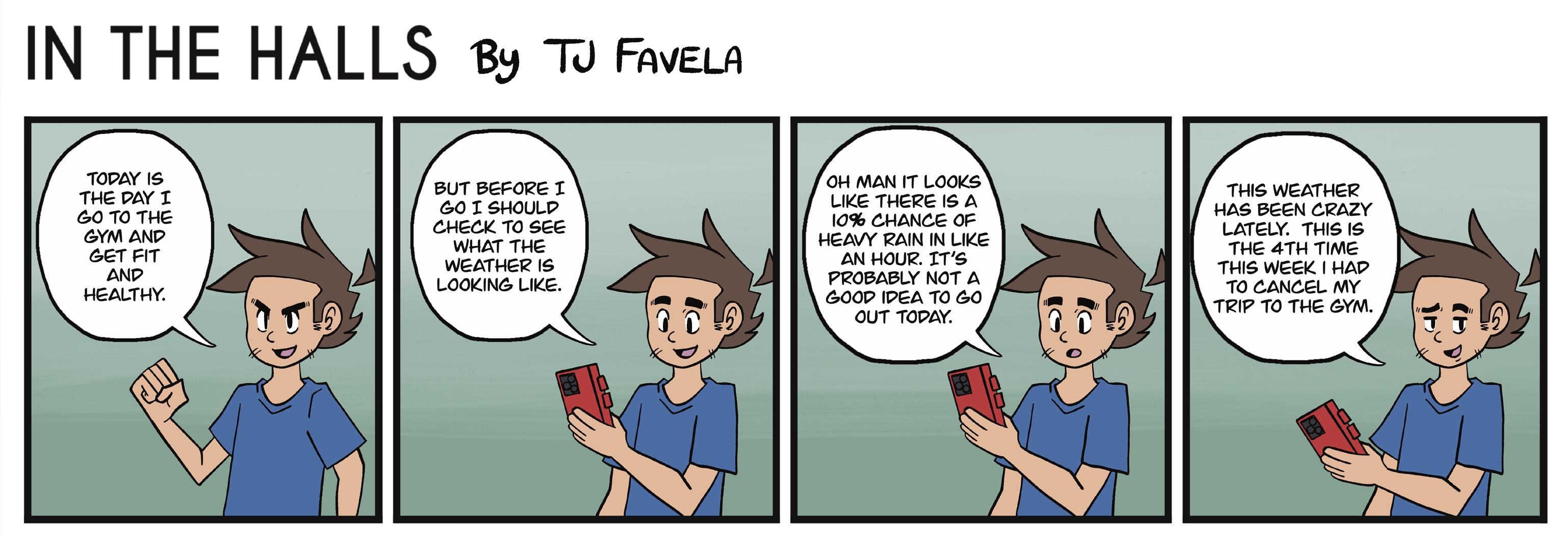
Tyler, the Creator removes his mask
ASH PETRIE campus editor ashleigh.petrie@my.tccd.edu
Chroma, intensity of color. Kopia, an imitation or reproduction.
Following the calming voice of a mother’s stern advice, a disturbing military procession begins with a metronome of chanting that overpower the whispers of Saint Chroma’s introduction. While layers of sound ramp up to a melodic outburst that define a generation’s paranoia and frustration.
Tyler, The Creator’s eighth album “Chromakopia” is a vulnerable discussion of the confusion young adults face while maturing in a world unconducive to growth. Saint Chroma is a masked character taken on by Tyler that permits him to freely contemplate his growth into the artist he is today.
Distinctive in sound, it’s easy to identify his music. Tyler sampled early 2000s hits like “Get Buck” and “Drop It Like It’s Hot,” layering them with beats from Nguni tribe vocals and old ‘70s tunes to accompany his aggressive sound.
The album is narrated by his mother. The warnings, affirmations and advice she gave Tyler while growing up are used as transitions to guide the listener through the album. Her voice acts as a focus.
Each song dives into Tyler’s observation of his life and the decisions he has made but in a way that resonates with fans. At 33 years old, he speaks on the difficulties of trying to appease the demands of family tradition during a shift in what younger generations desire from life.
Materialism and fame are believed to overshadow the necessity of family values and are used as an attack on young people. And while that idea isn’t denied by Tyler, he argues that tradition and pressure have driven young people away from growing up.
His mother’s advice from the beginning to end of “Chromakopia” urges Tyler to never trust anyone and instead live life for himself by never allowing another person to “dim his light.” However, the pressure from the world to grow up contradicts the advice given to be an individual.

This is a commonality for his fans and myself. As a child, I was told to be who I wanted to be. Individuality was taught to be important and that being different is what made me unique. As I got older, it was integral that I make decisions dedicated to what I wanted from life.
But as I’ve grown up, all I’ve felt is ridiculed by the world for not becoming who it wanted me to be. Daily, I submit to the American Dream, stressed for my future and barely making it by. In the album, paranoia has become real-




ity, walking with heads down hoping not to step out of line by making a simple mistake that will dictate the rest of our lives.
Tyler tells listeners to take the mask off, meaning to stop portraying oneself inauthentically.
“Chromakopia” is specific to Tyler’s life but is heard as a personal album created for whomever listens. Each track exposes a difficulty Tyler has faced that many in his generation can connect with.
Tyler leaves listeners with his mother’s advice of finding one’s light from within.
Contemplation of life is important, but to overanalyze and critique the decisions previously made only blocks growth. Take the past and use it to be better, to redefine yourself without leaving who you were behind. Growing up doesn’t have to mean regret because of what others believe. It is taking each milestone, whatever it may be, and utilizing it as a foundation to who you are.
State Champs meets ‘State Champs’ self-titled
CHEYENNE SHAWN campus editor cheyenne.shawn@my.tccd.edu
New York pop-punk band State Champs are back with their fifth studio album titled “State Champs”. This 12-track album blends their sound developed over the years, looking back on their roots while adding to it.
Typically, a band self-titles an album when they want to establish who they are and their message. However, State Champs stayed consistent with their well-known high-energy sound, catchy melodies and emotionally charged lyrics on this album.
The album kicks off with upbeat breakup songs about realizing someone isn’t who you thought they were. “The Constant” felt more like their overall style as a band. They continue with similar sound, “Silver Cloud” and “Clueless,”. Both having catchy lyrics and a punchy sound that makes the songs feel like you can dance and sing along to them. My personal favorite being “Silver Cloud”.
The first part of the album sets the scene with dealing with things after a breakup, but in a fun way.
The middle of the album starts to slow down instrumentally with songs “Light Blue,” “Too Late to Say” and “Hell of It,” capturing the reflective side of trying to approach an old love. These songs felt like they leaned into a more poppy sound with corny
lyrics.
“Tight Grip” has fun and relatable lyrics about life and not taking it so seriously anymore, switching the album back to its original fast pace. “I Still Want To” felt the most relatable to a post-breakup and the things it makes you feel. It talks about how even though there’s nothing to talk to your ex about, at times you still find yourself wanting to talk to them.
The band’s emotional depth comes through with “Just a Dream” showing a youthful energy to pulling themselves together. State Champs wraps up by slowing down the album enough to close it out without ruining the overall upbeat vibe to an album dealing with a post breakup.
They provided an album with relatable songs you can dance along to while getting feelings from the lyrics, sad but happy. There is a noticeable change of emotions throughout showing how you realized someone isn’t around anymore, losing yourself a little in emotions to pulling yourself out of it all.
State Champ’s fifth album was a good description that combined their sound from over the years. In an interview with Rolling Stone, the band said this record was used as a defining statement to their career.

Community ties will combat oppression
Donald Trump will be serving his second term as president of the United States.
For many, this fact is met with a sense of fear. It means holding their breath and hoping their lives aren’t dramatically upended by proposed policies meant to restrict people like them.
As we enter a new political landscape, a cultural shift comes with it. The pipeline from conservative values to hateful ones is becoming alarmingly common and accepted as morally sound.
People are becoming bold with their remarks after confirmation of Trump’s second term. From threats like “Your body, my choice” to straight-up hate speech, the United States is inching towards becoming a hostile, even dangerous, place for a lot of marginalized individuals.
The fears are valid. Transgender individuals could be denied the simple right to exist as they want. Women could be denied care that shouldn’t be questioned in the first place. Immigrants are being forced to question their safety and whether violence will come with Trump’s promise of mass deportations.
A recent example of the escalating climate happened at Texas State University. Two men were seen with homophobic and misogynistic signs on campus, according to The University Star, Texas State’s student media outlet. They were met with counter-protests and escorted off campus.
More individuals are feeling comfortable expressing hateful and exclusionary views. To combat the harm this is causing we should look toward past civil rights struggles, where community engagement

and educational tactics were used to bring people together with the common goal of protecting communities being targeted by hate campaigns.
The malicious agenda happening now shouldn’t be simplified to Democrats vs. Republicans. In the end, it comes down to recognizing who has a base level of respect for the humanity of every individual and who does not. Who is the oppressor and who will help resist it?
There’s more resistance within the population than people think. When
the issue is looked at this way, there is hope. Why? It allows for successful organization and mobilization of people to minimize distress when a certain population is facing significant harm from the government or malicious groups.
It’s counter-productive to assume most people have bad intentions. This line of thinking limits the possibility of the amount of aid and support for those in dire need and creates unnecessary conflict. This energy could be funneled into
Don’t let online hate define you

It could be considered a terrible idea to log onto Facebook the morning after election results were posted, but it was an eye-opening experience seeing what was displayed on a 6-by-3-inch screen.
Both sides argue the other candidate’s rhetoric fuels hate, and the media is running the show.
Each post swiped past displays a generated image with overlayed text describing a belief or blatantly ridicules another’s. With a simple click of a button, one can denounce a person’s existence and fuel a rage in people to attack.
It makes sense for a country to strive for greatness. However, hate and fear aren’t ways to generate a great country. Key terms and phrases used by powerful people to produce emotions are verbal attacks that have previously encouraged hate crimes.
So, I ask why. Why would a country allow such intolerance from both sides? Is it because the divide distracts the American people from the power-hungry individuals standing in Congress who seem to care more about a thriving country than the well-being of its people?
Or is it darker? Is there still an underlying agenda to destroy the communities in America who make this country great?

The arguments for border control, a better economy and accessible health care are based on our country’s belief to want to be better. But the words used to grab the attention of viewers paint an alarming picture.
Are these prejudiced cries for just that, attention? Are we as Americans so self-centered that discriminatory language must be used for us to care? Or is it that bigotry is so deeply rooted into our history that the words used are how people have always felt?
My hope is for the former, but what I see in the media leads me to believe otherwise.
When speaking to people at bars, events or on campus, a majority just want to survive, to live without fear or worry for the next day. People want to have a sustainable career, own a home, have a family, to travel, to eat food, to feel loved and important by the people around them.
So why is it that when logging onto a media account everything being discussed is hateful? Everyone has a boogie man out to get them, and online platforms point the finger at a specific community to be the source of other’s misfortune.
The media forced our country into an echo chamber that needs drama for change to be discussed. We have become so egotistical that we must have someone to blame rather than think about how we could have done better ourselves.
This constant back and forth has driven me mad. We continue to discuss the same issues over and over, but each time we have a different scapegoat. We choose to try fixing the issues by attacking it the same way, forcing the blame onto
others.
Insanity is defined as doing the same thing again and again but expecting different results, and it seems as if our country is promoting insanity. I know I feel that way.
But this chaotic state is easily settled when I get off my phone and go out to interview the people on our TCC campuses.
This semester was my first opportunity to write for a newspaper, and during these fleeting months of fast-paced reporting for The Collegian, my mind has been opened to an entirely new way of thinking.
At first, approaching strangers to ask difficult questions concerning politics, beliefs and personal struggles was terrifying. However, interviewing our community has taught me to approach these conversations with a kinder heart.
Attending events where I would be required to speak with individuals I’d let go unnoticed before has developed my ability to be empathic. While listening to some people may be difficult, choosing to do just that, listen, changes their way of perceiving you too.
Blatantly submitting oneself to the information provided online will only amplify the issues we face today. Instead, log off. Engage in community events and have genuine experiences to discover what you believe.
It is important to note that people will naturally question what they don’t understand, but by being patient and communicating with care, we can guide each other toward harmonious relationships.
Proceed in life with the openness of a child, and remember you aren’t the only one with a story to be heard.
TJ Favela/The Collegian
active steps for restorative change.
Most people lean toward helping those in need. A small example might be the instinctive urge to hold the door open or give up a bus seat for someone who needs it more.
These acts of simple care will definitively continue even if, or when, the hateful actions of some increase, and it’s necessary to hold on to them. It’s necessary to value them and not underestimate their impact. It’s disheartening to see the
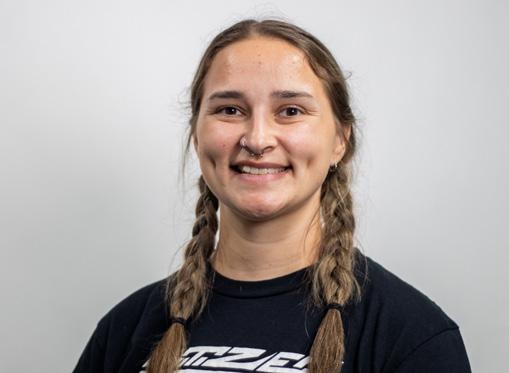
CHEYENNE SHAWN campus editor collegian.editor@tccd.edu
There was a time when tipping was meant for certain services, now it’s spread beyond to services that never relied on them before, leaving the question of who are we supposed to tip these days?
Tipping has become something expected of customers any place they go. Some experience guilt and shame when they don’t. The idea of tipping is now stressful.
What started in the 19th century when wealthy Americans brought the custom back from their travels in Europe, quickly being tied to the service industry. Tipping evolved into a way employers didn’t have to pay their worker’s minimum wage expecting customers to pay up the difference.
Tipping feels like it’s everywhere in your face now. The option is at a kiosk or the jar sitting on the counter in places like local coffee shops, ice cream shops, drive through places or picking up takeout. In the past it was only considered in the dining industry for servers and bartenders.
Life is already expensive. Inflation is an issue for many. Customers who are already potentially low on money that want to treat themselves shouldn’t feel guilty about tipping a large percentage because the employer doesn’t want to pay the employee more.
diminishing of optimism and firm belief in people necessary to stand strong in the face of abuse, not just when your own identity is being attacked but actively standing in solidarity with anyone being oppressed by a threatening government.
We can’t let go of the fact that a better world is possible. Oppressed communities have continued to assert their presence throughout world history, throughout U.S. history, and have stubbornly preserved their stories through sheer force of will. The gravitation to despair serves no purpose but to paralyze the possibility of change.
It’s vital to get involved in local volunteer projects, mutual aid, education initiatives and community-building events to preserve that historically liberating optimism.
Getting to know how the people around you live and how their lives can be made easier is one step toward combatting the isolation and loneliness that allows discrimination to succeed in its mission. Times are tough. They are. However, there will always be the choice of being dedicated to keeping the practice of protecting those in need strong and healthy. The choice to argue for why it’s important to believe in others, even if it sounds naive, is how we survive. The option to refuse to comply hasn’t gone away even as the government tightens its grip. It’s an option that requires us to rely on each other.
It requires us to be upset and angry, but never in despair. If anger is directed towards injustice, that is where action happens. But, if hopelessness is the priority, we will be standing still forever.
The expectations have changed in recent years, a 15-20% tip for good service now the suggested percentage is 20-25%.
Servers and bartenders really shouldn’t have to “earn” their wages, especially when faced with factors out of their control with what time or weekday it is or the generosity of the customer. Which often leads to inconsistency, giving money to services that may or may not have been good.
It now feels like a social obligation rather than a voluntary reward.
In recent years the laws have changed to where the back of the house is considered in with tip share. Tip pooling is required to share earnings with the workplace.
A solution may be to rethink tipping, instead of relying on customers, businesses could start a transparent fair pay wages that provide the employees with a living wage.
In other countries, either tipping is nonexistent, or service charge is included in bill already, so customers don’t have to stress about the appropriate tip.
Something like that could work in the U.S., creating a more straightforward environment for both workers and consumers. What about going back to basics where tipping is rewarded for going above and beyond.
Tipping gradually got out of hand in recent years. It was shifted from being a reward for service into an expectation in nearly every transaction, leaving us confused on who are we supposed to tip and how much.
The question remains, who are we supposed to tip and how much?
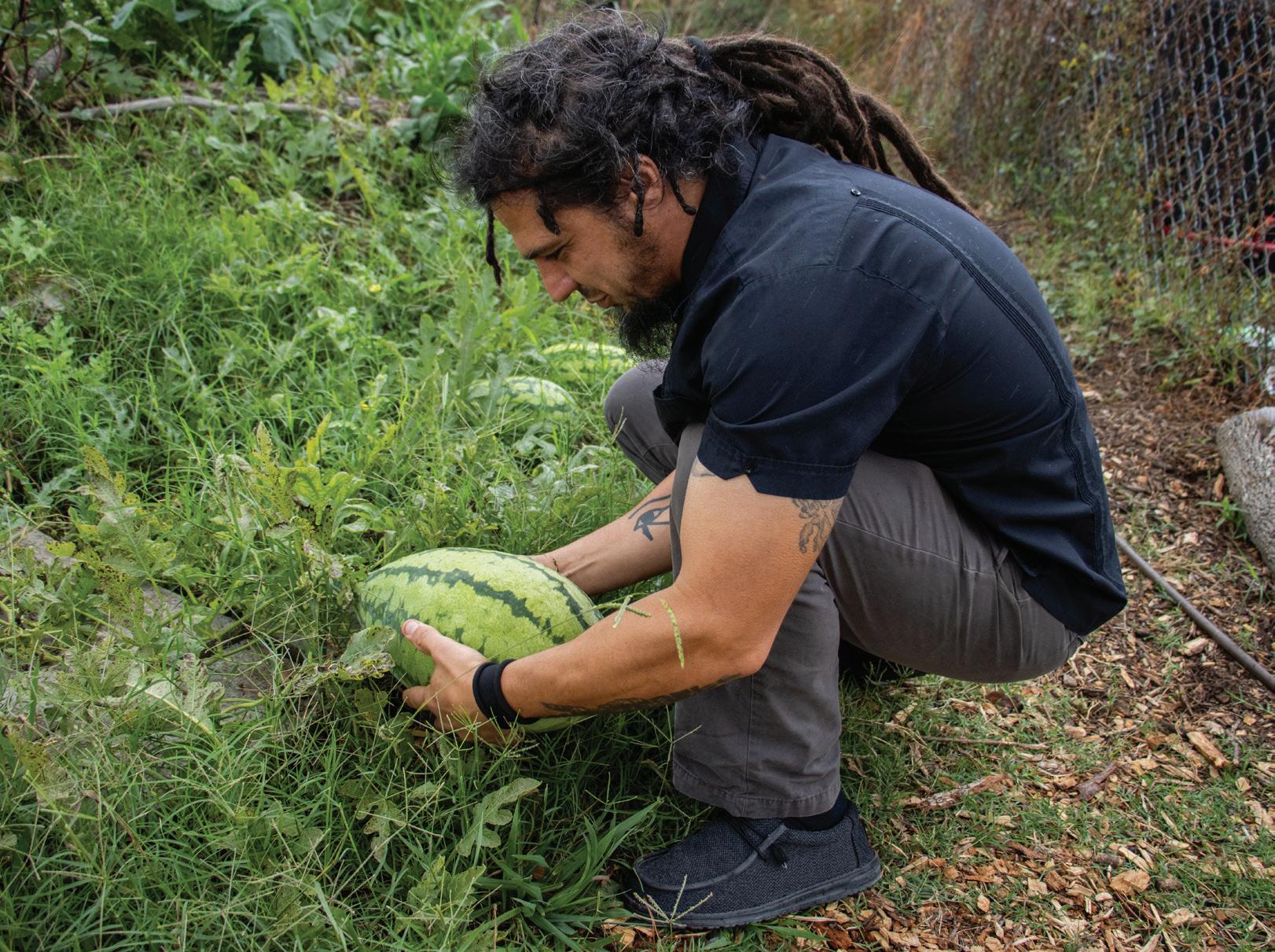
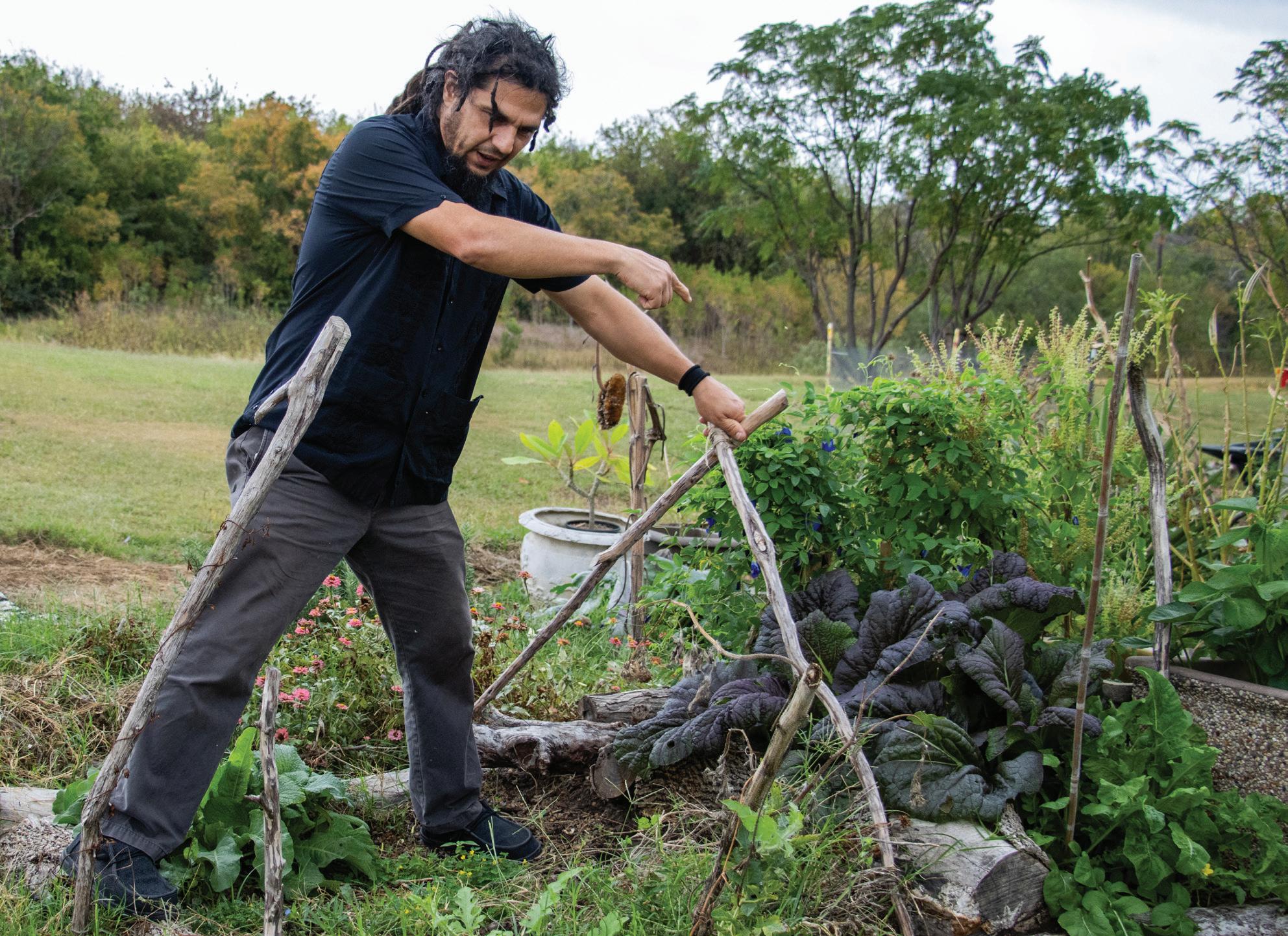
History professor determined to restore his community
ASH
PETRIE campus editor ashleigh.petrie@my.tccd.edu
It was a muggy Monday morning with tornado warnings broadcasted that Bradley Borougerdi wandered meticulously through the garden on SE Campus. Even as the rain began trickling onto his face, he continued tending the complex conservatory he’d handcrafted.
If he isn’t in the garden, Borougerdi can be found in his office, where the walls are hidden behind shelves overflowing with books. He is a history professor at SE and oversees the garden with the help of student volunteers and employees.
“We have a small aquaponics system in there now,” Borougerdi said. “We have a composting station where we’ve been bringing organic matter from all over the Metroplex and taking it to that location to make our own soil and heal the soil.”
Borougerdi’s motivation to teach the community gardening methods was influenced by a name he found on a pillar. After being awarded a sabbatical development leave, he went on a year trip across the U.S. to conduct research from different archives and national parks.
His journey ended in Montgomery, Alabama where he visited the National Memorial of Peace. It was the first memorial constructed in the U.S. dedicated to the victims of racial terror after the Civil War. The six-acre memorial is covered with steel monuments engraved with the names of those who were lynched.
“I saw a pillar and it said ‘Fred Rouse, Fort Worth, 1921,’ and that kind of shocked me,” Borougerdi said. “I was born in Fort Worth. I’ve been teaching about racial terror, violence my whole life, and I didn’t know that this happened in the city I was born in.”
The disturbance followed him home and powered him to establish the Tarrant County Coalition for Peace and Justice. His organization found the plot of land that Mr. Fred Rouse was lynched on and discovered it was for sale, so they bought it in 2019.
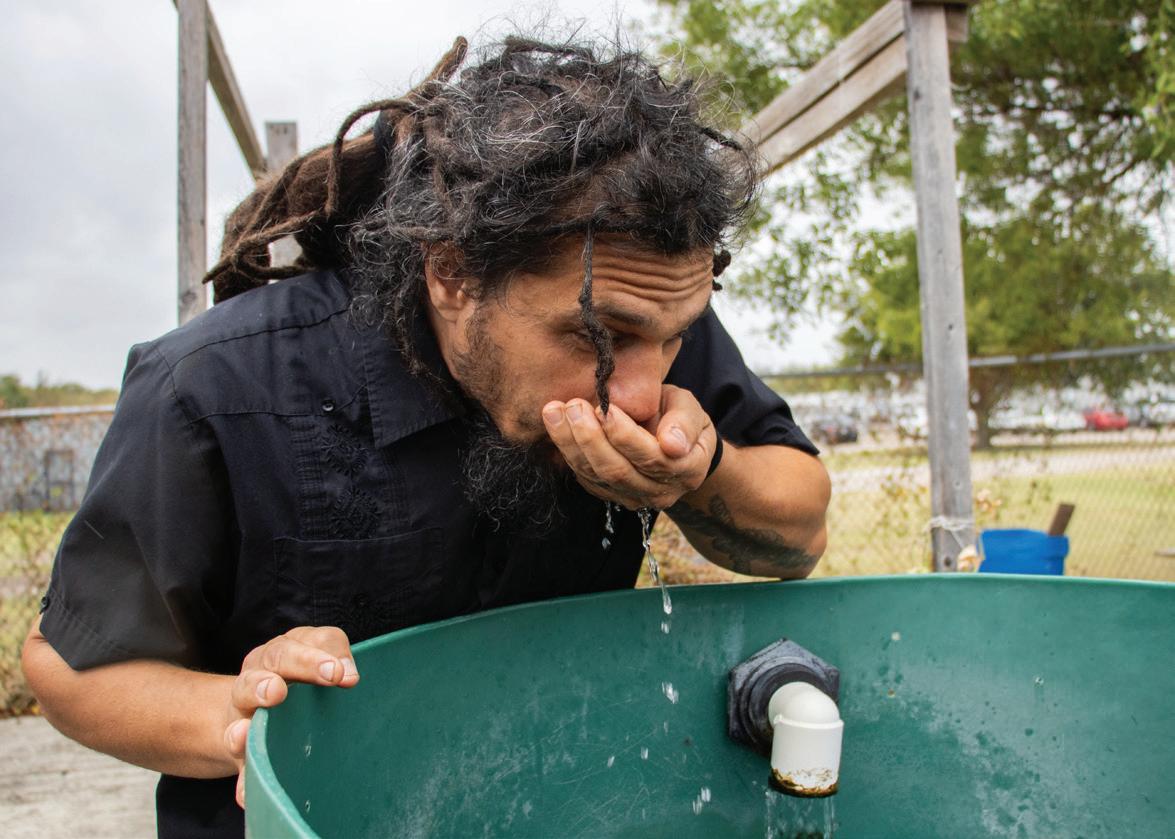
During this time, 28-year-old Atatiana Jefferson was fatally shot by a Fort Worth police officer while playing video games with her nephew inside of her home. Borougerdi went out to support his community after the tragedy, which is where he met Patrice Jones, who developed the Southside Community Gardens.
Jones’ organization builds garden plots in people’s homes who live in zip code 76104. This area has the lowest life expectancy in Texas by a decade, and there are no grocery stores anywhere. Borougerdi began volunteering for Jones shortly after meeting, and it was this sequence of events that stimulated his incentive.
“It kind of just started coming together for me, like this idea of the soil and the land, and the importance of taking care of the soil and taking care of the land,” Borougerdi said. “What if we can combine...the studying of history, with taking care of the land?”
Borougerdi and the Tarrant County Coalition proceeded with a mission to heal the soil where Rouse was murdered. They dug a massive hole on the plot and buried hackberry logs inside, because it was a hackberry tree upon which Rouse was lynched. All the soil removed was placed into jars to be taken home and composted.
“The idea was by composting [the soil], it heals,” Borougerdi said. “Then, when the memorial is built, bring it back. Bring some soil back and put it back into that plot.”
A jar of soil was also sent to the National Memorial of Peace, where it still sits today next to Fred Rouse’s pillar.
Since then, Borougerdi has devoted his time to educating the community on how to garden.
“The first time I ever saw a child look at a tomato growing in the dirt for the first time in their life was just very powerful,” Borougerdi said.
What started in 2015 as a small-wooden gardening box for students has now become a massive-thriving plot of land with an array of plants. An aquaponics system was installed in 2017 that pumps water from a tank raising fish into a bed of rocks home to basil, arugula, peppers and more.
“This stuff is so clean that you can drink it, and nothing happens,” Borougerdi said as he took a handful of water from the fish tank and drank it.
His daily routine begins at 6:30 a.m. when he takes his shoes off to walk through the vast greenery. The time spent in the gardens, he said, is therapeutic and vital to his well-being. While teaching how to garden is important, what gardening has taught him changed his life.
“You’re planning, your goal oriented, you’re looking at things, you’re watching them grow,” Borougerdi said. “You see how long it takes for them to grow and how much care they need. And you can kind of think about how that relates to life really well. And can kind of help you work through things.”
Marco Bustamente has worked alongside Borougerdi in SE’s Garden for a little over a year now. He is studying to be a food scientist, so when he heard about the garden while taking Borougerdi’s American History class, he immediately joined.
Bustamente said Borougerdi is a mentor and a friend. They spend a lot of time together gardening, and Bustamente said the hours of hard work accompanied by Borougerdi has instilled lifelong lessons into him.
